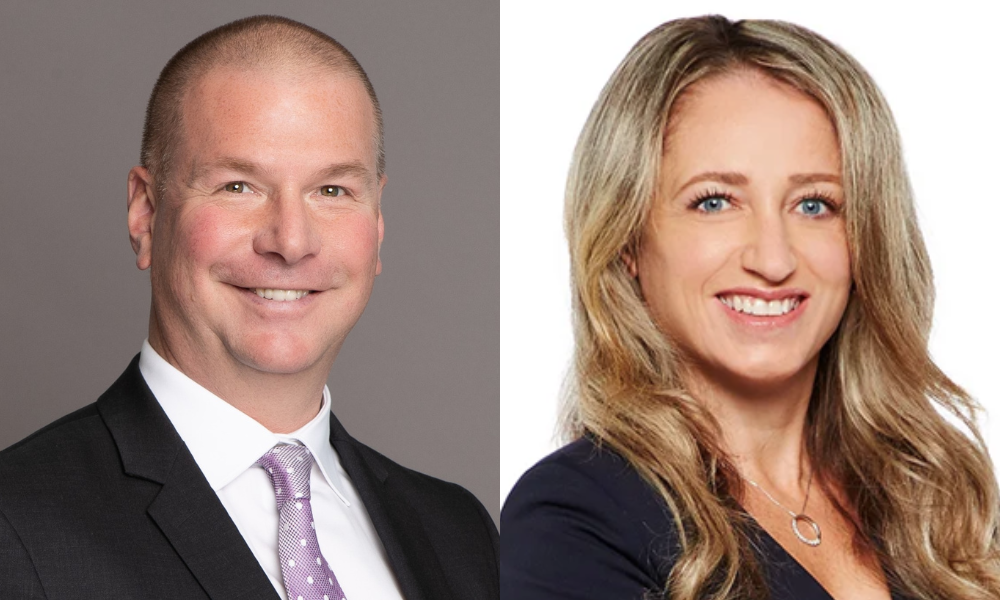Education the key to unlocking full power of illiquidity premium

After the challenges of 2022 rocked both stock and bond market valuations, countless retail investors learned a harsh lesson in risk management: the 60-40 portfolio isn’t invulnerable. But according to one investment industry leader, too many people don’t know there’s something they can do about it.
“People don't know there are illiquid investment opportunities that are now becoming available to them,” says Allan Seychuck, VP and senior investment director of Alternatives at Mackenzie Investments (pictured above, left). “Private markets products have really only become available to retail investors in Canada over the last couple of years.”
Last year, Mackenzie launched the Mackenzie Northleaf Private Credit Interval Fund, which Seychuk says is the only fund in Canada that invests in private credit and is available to all retail investors. The firm also provides three other private-market offerings with exposure to private infrastructure, private credit, and private equity through its partnership with Northleaf Capital Partners.
“All four of our Mackenzie Northleaf products have liquidity available on either a quarterly or annual basis,” Seychuk says. “There are no hard lockups on any of the Mackenzie Northleaf funds, and we designed them that way for retail investors’ use.”
With 98% of the companies in North America today outside the public markets, qualified retail investors who overlook the private markets are missing out on an ocean of opportunities. Ida Khajadourian, award-winning portfolio manager and investment advisor at Richardson Wealth, makes sure clients at her practice are apprised of that fact.
“Having an element of private assets in your portfolio gives you diversification, and a different return stream,” Khajadourian (above, right) says. “Oftentimes, we are providing access to assets that are just not typically available to average retail investors, which could lead to higher returns, and ultimately lower volatility as assets are priced at net asset value.”
For a lot of investors in the retail space, the idea of having their money locked up for any period longer than a day might feel like an absolute risk. But that kind of thinking, Seychuk says, ignores the illiquidity premium members of the “smart money” club have recognized and harvested for decades.
“Institutional investors are not interested in having their entire portfolio liquid. Same for endowments, foundations, and pension managers,” he says. “Why should retail investors behave differently? Why does every retail investor need every dollar that they have invested or saved to be liquid on a daily basis?”
The historically higher returns of less liquid assets compared to publicly traded securities can be broken out into several pieces. Private capital is patient and invested for the long term, and private equity investors often have informational advantages compared to publicly traded companies. Privately held companies are also generally smaller in scale compared to many publicly listed names, giving private equity managers much more runway for initial-stage and second-stage growth.
“Being alongside institutional-type investors or ‘smarter money’ in private markets means you’re potentially getting into certain investments and projects from the ground up, where there’s greater potential for upside,” Khajadourian says.
Owners of privately held companies have greater operational control, allowing them to implement larger-scale and transformational changes that can drive growth. Investors in private companies also have more control over when they sell a company, in contrast to investors in public equities that are more subject to panic or irrational exuberance.
“Being in the private space means investors are staying invested instead of timing the market,” Seychuk says. “Market timing does not work.”
Even after being educated on the differences between public and private assets, some clients may nonetheless be more comfortable having their portfolios concentrated in more liquid investments. In those cases, Khajadourian finds it’s best not to force the issue.
“If there’s a comfort or risk appetite issue, I don’t like to press that because you could get into a situation where the client might need that liquidity for whatever reason, and that’s what lets them sleep at night,” she says. “My preference would be to always educate first, and we could always revisit in the future if their circumstances change.”



